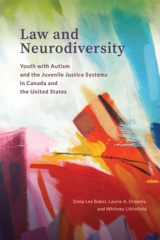
Unmothering Autism
Ethical Disruptions and Affirming Care
As global rates of autism diagnosis rise, dominant cultural representations continue to define autism as a tragic neurological disorder. And mothers – as primary caregivers and advocates – are centrally implicated in the impulse to find both cause and cure. How should we care about autism and autistic people?
Unmothering Autism emerged from Patty Douglas’s desire to understand a contradiction: she and her two sons (one autistic) experienced beauty living together, while their public encounters with doctors, school professionals, and agencies were fraught and sometimes violent. Interspersing her own insights and conversations with other mothers, Douglas offers a critical history of popular and biomedical assumptions about autism, expressed through shifting social constructs: the white “refrigerator mother” of the 1940s who seemingly caused autism by her disordered love; the “mother therapist” from the 1970s on, compelled to labour to normalize her child with behavioural practices; and today’s “warrior mother” who must watch her own behaviour to eliminate autism in her child.
Unmothering Autism theorizes an “ethics of disruption,” reorienting research and practice to affirm autism and autistic people as valuable and fundamentally human. It centres the previously marginalized perspectives of mothers and autistic individuals to affirm their knowledge of living well together in, and through, difference.
Scholars of education, disability studies, and feminist studies will find this compassionate, creative investigation illuminating, as will educators and parents of disabled children and members of autistic, neurodivergent, and disability communities.
Unmothering Autism is articulate and theoretically sophisticated while still grappling with a very important and impactful issue: care.
Patty Douglas’s book fundamentally challenges the dominant narrative about mothering an autistic child found in both the popular media and caretaker autobiographies, and replaces it with a more nuanced understanding of how mothers contest both traditional role expectations and disabling views of autism.
Patty Douglas is an associate professor of disability studies, the inaugural chair in student success and wellness, and director of the Centre for Community Engagement and Social Change in the Faculty of Education at Queen’s University. She leads Re•Storying Autism (www.restoryingautism.com), a multimedia storytelling project located in Canada, the United Kingdom, and Aotearoa (New Zealand), and is a sought-after international speaker. She is also a senior research affiliate at the Re•Vision Centre for Art and Social Justice at the University of Guelph. Patty identifies as neurodivergent and invisibly disabled and is the mother of two neurodivergent sons, one of whom identifies as autistic.
Introduction: Toward Ethical Disruptions and Affirming Care
Part 1: Disrupting Autism Mothers
1 Disruption as a Place to Begin
Part 2: Pursuing Autism Mothers
2 Autism’s Refrigerator Mothers: The Psychoanalytic Gaze
3 Returning the Psychoanalytic Gaze
4 Autism’s Mother Therapists: Behaviourism’s Gaze
5 Retraining Behaviourism
6 Autism’s Warrior Mothers: The Genomic Gaze
7 Resisting Genomics and War
Part 3: Reimagining Mothering, Autism, and Care
8 (M)others Speak Back: Affirming Autism and Care
Conclusion: Is Neurodiversity’s Mother Next?
Notes; Works Cited; Index










